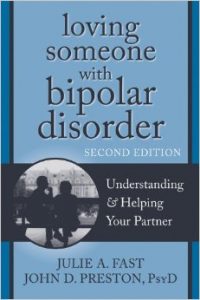
When I’m in an abandonment downswing, I think, “I am a worthless ant, a speck of dirt on this huge revolving planet. I’m completely alone!” The idea that I’m the last person on earth and no one loves me is a typical depression symptom. It’s not personal, and it’s not true. It’s a sign that I’m depressed.
Three signs of abandonment depression
- You do have people who want to help, but you ignore their words and actions. You feel like even pets don’t want your company.
- The abandonment feeling encompasses home, work, and the world in general. You feel that EVERYONE and EVERYTHING is leaving you.
- The abandonment feelings are not attached to an event. Events (triggers) can exacerbate your feelings of abandonment, but you will NOT be able to find proof that abandonment is actually happening.
Did you know it’s normal to feel abandoned when you have bipolar depression? Just like it’s normal to feel shaky if you have diabetes and your insulin is low. We have an illness, not a personal problem.
The good news is that symptoms can be managed. There is nothing wrong with your life when you feel abandoned while depressed; there is something in your brain that needs to be treated. When you manage your depression, the feelings of abandonment can go away. Honest.
Here are my typical abandonment depression thoughts:
- No one is calling me.
- My friends are too busy for me.
- My nephew is growing up and doesn’t want to be with me anymore.
- There is something about me that people don’t like.
- No one else has problems like this.
- Why are all of my friends so much happier than I am?
- What is wrong with me?!?
See how this cascades? It can be especially tough at night when I try to sleep or I wake up too early and can’t get back to sleep.
If you love someone with bipolar disorder who gets these abandonment symptoms when depressed, what can you say? Here is a script to get you started:
I hear that you feel lonely and that no one wants to be with you. I have heard this in the past when you’re depressed. I looked at the actual events around you and realized that you are not able to answer your phone or say yes to things because your brain is off track. Let’s talk about your depression and get you back into the life you care about; I know your feelings of being alone in this world will lift as well. They are a symptom of this rotten illness. How do I know this? Because I’m standing next to you and I’m not going anywhere, no matter what.
I asked Martin Baker—the coauthor along with Fran Houston (who has bipolar disorder) of the book High Tide, Low Tide: A Caring Friend’s Guide to Bipolar Disorder —how a friend can help someone thorough an abandonment episode: “Julie, I recognize the internal dialogues you’ve listed (‘No one is calling,’ etc); I have heard them from Fran many times. My response is not to bombard her with contradictory assertions: ‘Of course they like you!’ ‘You are imagining it’ ‘There’s nothing wrong with you—you are a fun, lovely person; anyone would be proud to be your friend!’ That kind of talking doesn’t honor what Fran is actually feeling. A better response is to simply be there. Be the person who does call. Be the person who isn’t too busy. Be the person who demonstrates (not merely says) that you are likable, and liked.”
What about you? Having a plan in place to counteract these feelings of abandonment is my best advice for maintaining relationships when you have bipolar depression. I have learned to recognize my abandonment symptoms. My first rule for getting through an abandonment episode is not hiding in my bedroom. And I force myself to pick up the phone when it rings, or answer that email from a friend. It is so hard, but it works. You can do it!
Julie
– This article was original publishing in Bp Magazine.










